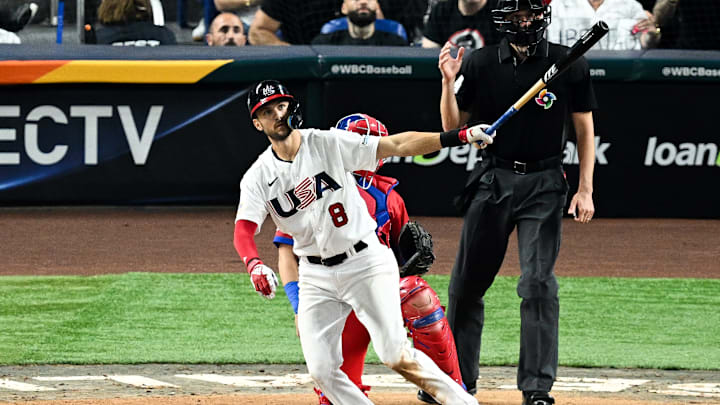It's not just that the Dodgers let shortstop Trea Turner leave in free agency for a monster contract, only to watch him blossom and become Team USA's centerpiece months later in an already-iconic World Baseball Classic.
Obviously, the machinations were more complex than that. The Dodgers have every intention of dumping their entire free agency budget -- and more, probably, if they can scrounge up a few extra coins -- on Shohei Ohtani next offseason. They'll move mountains to secure that promise. It'll probably mark the end of Julio Urías' tenure in Los Angeles, too. Turner will not be the only casualty.
And obviously Turner's 11-year, $300 million contract with the Phillies wasn't just any deal. It's difficult to look Andrew Friedman in the eyes and say there's no way he could let Philadelphia punk him like that and demand that he match the money. Clearly, Dave Dombrowski wanted to make that close to impossible, and he succeeded.
It's just ... it's tough to look at the totality of Turner's journey in Los Angeles and realize that it wrapped with close to the worst-case-scenario outcome. Turner's 2021 Dodgers didn't advance past the NLCS, even after they'd paid prospect capital to replace Corey Seager, the homegrown superstar/postseason icon who most believed would be there forever.
His 2022 team matched records in the regular season, but came up small in October, felled in a four-game NLDS. Turner's unmatchable contract hit the books a few weeks later, but the Dodgers both let him walk and stayed above the luxury tax threshold anyway, for whatever reason.
And now, Turner's the most important clutch player on Team USA's World Baseball Classic finalist after he (probably unfairly) garnered a reputation for coming up small in Los Angeles (mostly on defense; he hit .333 with a pair of homers in last year's ill-fated postseason trip).
How the Dodgers just let this man walk away? 😳 pic.twitter.com/yDWF3Ldn0D
— Xavier Scruggs (@Xavier_Scruggs) March 19, 2023
Los Angeles Dodgers let Team USA star Trea Turner walk. Looks bad!
It's not the decision to let him walk or the decision to pursue Ohtani. It's the holistic big picture that saw both Seager and Turner filling a prominent role in LA, only for neither of them to be here and Turner to be arguably more well-known than ever.
Turner's October reputation is somewhat perplexing, too. Anywhere you look, you'll see Dodgers fans bemoaning his performance and untimely strikeouts. In reality, in a small sample size, it's hard to do much better than Turner did last postseason, even though he was forced to wear the blame intended for the entire unit. And that makes sense, too.
Trea Turner in October for the #Dodgers: 0-for-500, 378 K’s
— Jeremy Dorn (@jamblinman) March 19, 2023
Trea Turner in March for #TeamUSA: pic.twitter.com/9HNFyMcy53
It's now impossible to pretend that letting Turner go was justifiable because he's missing some sort of "clutch gene"; his go-ahead grand slam in the eighth inning of Team USA's semifinal vs. Venezuela will go on to be the seminal highlight of this team's repeat bid, whether or not they can finish it off against a far-too-good Japan team.
It's also tough to tie Turner's/Seager's departure into an Ohtani pursuit, considering the tax wasn't ducked and Friedman and Co. could easily go into Steve Cohen Mode if they had to (and they'll need to, in order to compete with the Actual Mets).
The bottom line is that the Dodgers' reasons for letting Turner depart seemed wholly justified until we saw him again, and until the world realized the team that transferred power from iconic shortstop to iconic shortstop is now without a shortstop (while their old shortstop is busy making more iconography).
